|
|
|
Sort Order |
|
|
|
Items / Page
|
|
|
|
|
|
|
| Srl | Item |
| 1 |
ID:
146909
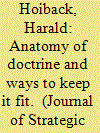

|
|
|
|
|
| Summary/Abstract |
The word ‘doctrine’ has been part of military terminology for more than 100 years. Even though the word is ubiquitous in modern military literature, it is still ambiguous and tends to put very different ideas into readers’ mind. In order to make the concept less vague and thus more useful, this paper explores the historical and pragmatic origin of the concept, and points out some of its potential pitfalls. The main message of the article is that, although it can be extremely hard to make a viable doctrine, it is worth the effort.
|
|
|
|
|
|
|
|
|
|
|
|
|
|
|
|
| 2 |
ID:
146915
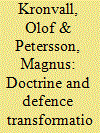

|
|
|
|
|
| Summary/Abstract |
In this article we analyse to what degree the three functions of doctrine proposed by Harald Høiback – doctrine as a tool of operations, a tool of education, and a tool of change – have driven defence transformation in two Scandinavian states, Norway and Sweden. We conclude that doctrine, both allied and national, has had some impact on defence transformation in both countries: through the operations in Afghanistan, through education both at the branch level and joint level, and through organizational adaption to (first) the US ‘RMA paradigm’ and (later) to the subsequent ‘COIN paradigm’. However, other factors, such as threat perception and defence spending, have also played an important role. It also remains to be seen whether the changes are ephemeral or of a more permanent nature.
|
|
|
|
|
|
|
|
|
|
|
|
|
|
|
|
| 3 |
ID:
146911


|
|
|
|
|
| Summary/Abstract |
Continuing the focus on military doctrine in this special issue, this essay explores institutional mechanisms that enable otherwise rigid bureaucracies to innovate. Rather than focus on organizational and strategic culture, the piece explores the role of pragmatic officers using incubators and advocacy networks to escape their iron cage. The piece traces the institutional origins of the US counterinsurgency doctrine between 2003 and 2006 to highlight the role of special study groups and cross-cutting bureaucratic coalitions in creating a space to deliberate over how to fight the wars in Iraq and Afghanistan.
|
|
|
|
|
|
|
|
|
|
|
|
|
|
|
|
| 4 |
|
| 5 |
ID:
146907
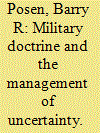

|
|
|
|
|
| Summary/Abstract |
Organization theorists have long argued that the management of uncertainty is a major motive of organizational behavior. Military organizations must deal with very high levels of uncertainty. Some uncertainty comes from the international political environment that gives the Military organizations life; some arises from the possibility of direct intervention by formal authorities upon whom the organization depends for critical resources; some emerges from the mixed motives of organizational participants; some arises from the fact that Military organizations do not get much realistic practice; and some arises from the very nature of combat. Doctrine is one of the many ways that militaries address these uncertainties. But doctrine writers make tradeoffs among these problems, tradeoffs that are themselves reflective of the politics of the moment.
|
|
|
|
|
|
|
|
|
|
|
|
|
|
|
|
| 6 |
ID:
146916
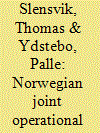

|
|
|
|
|
| Summary/Abstract |
The second revision of the Norwegian Joint Operational Doctrine (NJOD) is an example of how a small state within the NATO framework presents a national ambition of conducting joint operations. Even if NATO doctrine is the cornerstone for the application of military force in Norway, there are some unique conditions and ambitions that Norway has chosen to put into its own doctrine. With the revision, Norway has institutionalized and formalized the doctrine process based upon the experience from earlier efforts and the NATO procedures. It has established a process that ensures a continuous doctrine cycle with few resources and can easily draw on more resources in a project-based development if need be. The process is discussed on the basis of the official minutes from the relevant meetings. This gives a unique insight in the process, and the challenges and solutions a small nation meets in creating national doctrines.
|
|
|
|
|
|
|
|
|
|
|
|
|
|
|
|
| 7 |
ID:
146912


|
|
|
|
|
| Summary/Abstract |
This article argues that US military doctrine, and by extension that of most Western militaries, missed an opportunity in the period following the Cold War to rediscover the many types of military strategies employed to good effect before the industrial-age wars of the twentieth century. This missed opportunity resulted in Coalition forces having to relearn many of those strategies through costly trial and error in Iraq and Afghanistan.
|
|
|
|
|
|
|
|
|
|
|
|
|
|
|
|
| 8 |
ID:
146910
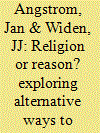

|
|
|
|
|
| Summary/Abstract |
In this article, we address the often ignored issue of quality standards for doctrine. In doing so, we contribute to the existing literature on military doctrine, since much of previous research has focused on outlining the effects of doctrine or the causes of particular doctrinal content, rather than how we should measure its quality. The predominant way of understanding quality of doctrine is based on the rationalist understanding of doctrine as a force multiplier. However, rationalist aims do not necessarily tell us anything about the contents of doctrine. Hence, a doctrine can be seemingly of high quality, but ultimately impede or lead armed forces astray. Rather than focusing on the utilitarian side of doctrine, we suggest that doctrine should mainly be understood as articles of faith or a belief system. And thus the quality of doctrine becomes inextricably linked to military norms and military identity. Writing doctrine thus becomes part of ritual, rather than reason.
|
|
|
|
|
|
|
|
|
|
|
|
|
|
|
|
| 9 |
ID:
146913
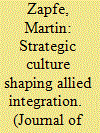

|
|
|
|
|
| Summary/Abstract |
With the Afghan mission winding down, the German Bundeswehr is in the process of implementing a new doctrinal system, resting on the adoption of NATO doctrine and a new joint operational doctrine. This is a historical first, which this paper argues is explained by two factors: functionally, for armed forces deeply integrated into NATO, the practical need for a joint operational doctrine did not exist. More importantly, culture matters: Germany features a highly institutionalized strategic culture that places distinct limits on some forms of joint doctrine. Thus, while impressive and logical, current doctrinal plans of the Bundeswehr, relying as they do on an ‘alliance shortcut’, raise important questions that need to be answered to ensure continuously functioning civil-military relations.
|
|
|
|
|
|
|
|
|
|
|
|
|
|
|
|
| 10 |
ID:
146914
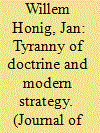

|
|
|
|
|
| Summary/Abstract |
The formation of doctrine and strategy is usually regarded as the exclusive province of the major powers. Small states and their militaries have little choice but to conform. This article, however, argues that small, developed states possess an unprecedented opportunity independently to form doctrine and pursue strategy. The reasons are a worldwide trend of devolution in political power and a concomitant democratisation of violence and reduction in the scale of military means and conflict. However, seizing this opportunity is powerfully constrained by the tyranny of outmoded ideas of how war and strategy work.
|
|
|
|
|
|
|
|
|
|
|
|
|
|
|
|
|
|
|
|
|